
Cloudeight InfoAve Weekly
Issue #1131
Volume 22, Number 34
June 13, 2025
Dear Friends,
Welcome to Cloudeight InfoAve Weekly Issue #1131. Thank you for subscribing and for being a part of our Cloudeight family. We appreciate your friendship and support very much! Please share our newsletters and our website with your friends and family.
If you're not getting our InfoAve Daily newsletter, you're missing out on a lot of good stuff!
It's free and it only takes a few seconds to sign up. We'd love to have you with us. Visit this page to sign up for our Cloudeight InfoAve Daily Newsletter.
![]()
We gladly help everyone who writes every day by answering their questions and helping to solve their computer problems. Please help us continue to do that!
Make a small donation and help us help you!
If you don't need any of our products or services right now, please help us with a donation. Even the smallest gift is appreciated. Every donation helps us to provide useful information that helps you with your computer as well as helps us to keep you safe on the Internet. We offer free help to thousands of people every year... and we offer an honest and inexpensive computer repair service too. We do everything we can to help you with your computer and keep you safe too.So if you don't need any of our products or services right now, please help us by making a donation right now.
Interested in making a monthly gift? Visit this page. Help us keep helping you!
Thank you so much for your support!
![]()

Barbara is having problems with
downloaded files
Good Day. Thanks for the
opportunity to ask you for help. I use
Windows 10. Something happened overnight
on my computer that I cannot fix. My
DOWNLOAD file changed to a MUSIC file.
When I download anything that is
supposed to go straight to my download
file, it goes to my music file, but when
I search my downloads by name, it takes
me to the MUSIC file, but it reads
DOWNLOAD. In the meantime, I opened a
new file, DOWNLOAD, just to get my
downloads into a download file and not a
music file.
As I type, I am confusing myself now by
the wording. I hope you can understand
the problem; otherwise, I will try to
rephrase. Thank you, Barbara
Our answer
Hi Barbara. I'm confused too. There is such a thing as a music file, but
no such thing as a download file. And you can choose where any file is
downloaded by changing it in your browser. I think what you did was
direct a file you downloaded to your music folder, and your music folder
is now set as your download folder, so now everything is being
downloaded to the music folder.
- Click the three vertical dots (More) icon in the top-right corner of the browser.
- Select Settings from the drop-down menu.
- In the left-hand menu, click Downloads.
- Under the "Location" section, you'll see the current default download folder. To change it, click the Change button.
- A file explorer window will open. Navigate to the desired folder where you want to save your downloads and click Select Folder.
- Click the three horizontal dots (Settings and more) icon in the top-right corner of the browser.
- Select Settings from the drop-down menu.
- In the left-hand menu, click Downloads.
- In the "Location" area, you'll see the current download folder. Click the Change button.
- A dialog box will appear. Select the new location for your downloaded files and click Select Folder.
![]()
I downloaded Microsoft Designer 2010 and did not know it would have other downloads & updates. Now I have all these 2010 updates that I do not need. I remember there was a way for a person could get rid of those updates, but I forgot how to do it. They are in my Windows 10 Updates; there are seven of them, I think they want to install Microsoft Office 2010. Which I do not need. I have Microsoft Office 2019. Help.
- Once you find the specific update you want to remove, click on it to select it.
- Click the "Uninstall" button at the top of the list, or right-click on the update and choose "Uninstall."
![]()
For the past two days, when I go to shut down my laptop, I get a message telling me that whatever it is is preventing me from shutting down my computer.
"\Microsoft\Windows\DeviceDirectoryClient\RegisterUserDevice"
Then I get options to shut down anyway (which is what I've been doing) or go back and finish what I need to do. I noticed yesterday that I cannot print PDFs from the internet because I get this "Bad Request: Your browser sent a request that this server could not understand. Reference #7.45dfda17.1748617872.57bb2477
https://errors.edgesuite.net/7.45dfda17.1748617872.57bb2477
I typed the whole Microsoft\Windows... into my search bar, but get nothing that leads me anywhere. Please tell me what I need to do to shut down this program I started somehow so I can (I hope) print PDFs from the web again.
![]()
I've just recently (6 weeks) got a new laptop and now I've had a message come up (supposedly from Microsoft/Windows Security) saying "I'm locked out and to contact a certain phone number 1800 *** ***. I'm in Sydney, NSW (Australia), and 1-800 numbers are quite common here. Is this a scam? I am unable to do anything - like exit the notifications, although they have a "Leave" box, or shut down. HELP!
Our answer
Hi Yasmin. It's a scam. Here's what you need to do.
I hope this helps you, Yasmin.
![]()
We can fix your Windows computer... check out our low prices here!
![]()
Can I get patches or buy them for a Windows 10 computer? My computer is a Windows 10. I have 2 computers that run Windows 10. They can not be updated to Windows 11. Thank you for any help.
Our answer
Hi Paul. Yes, you can continue to get security patches (updates) for your Windows 10 PCs even after the official end of free support, but it will come at a cost.
- Free software updates from Windows Update
- Technical assistance
- Security updates or fixes
- This is a huge security risk, as new vulnerabilities will not be patched, leaving your computers exposed to potential attacks.
![]()
Passing this interesting claim (procedure) on to you for your review and thoughts. Install Windows 11 on ANY Windows 10 PC with NO data loss!
https://www.youtube.com/watch?v=C_p3dBrr_Sg
Our answer
![]()
Anne wants her web pages and emails to have black backgrounds and white text
All of my websites and mail come in bright white backgrounds and black letters, i want the background black and letters white like it used to be, and easier to read. I use Firefox to browse the web and check my email. Thank you very much.
Our answer
Hi Anne. The simple solution is to install the Dark Reader extension on
Firefox. Once you do, you'll be able to make backgrounds black on all or
just some pages. You can also change the font size. You can get Dark
Reader for Firefox for free at
https://addons.mozilla.org/en-US/firefox/addon/darkreader/.
I hope this helps you, Anne.

Now available: Reg Organizer 9.40
If you purchased or renewed Reg Organizer through Cloudeight within the
last 12 months, you're entitled to a free version upgrade to Reg
Organizer 9.31. Works great with Windows 10 and Windows 11.
Save $14 on Reg
Organizer right now!
Reg
Organizer - A Swiss Army Knife of Windows Tools - Works Great on Windows
10 and Windows 11.
![]()

Windows 10 / Windows 11
Voice recognition has come a long way. While still not 100% accurate, it’s reliable enough that you can use it to dictate recipes, emails, reminders, notes, essays, short stories, journals, and even angry letters to the editor!
To use the new and improved dictation feature in Windows 10 and Windows 11, press and hold down the Windows Key and tap the H key. Place your cursor in (almost) any text field and start talking. It works with many apps, including Microsoft Word, Notepad, WordPad, Gmail, Outlook, and Outlook.com.
Using Windows 10 Dictation
Use the Windows key shortcut Windows key + H to begin. Click the “microphone” icon in the dictation bar.
![]()

When it’s done initializing, you’ll see “Listening,” and then you can start talking. Here’s an example of Windows 10 Dictation being used with Notepad.
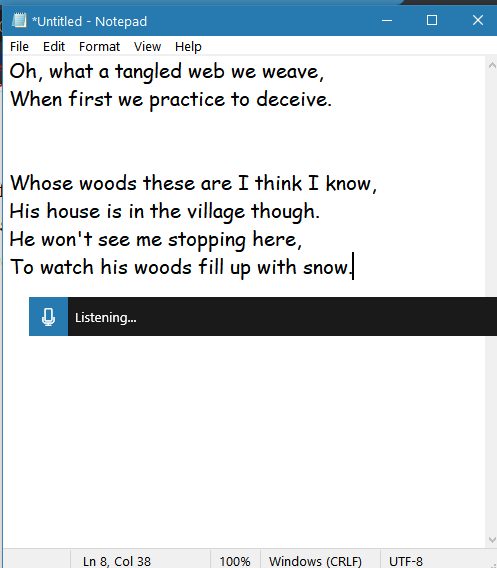
As you can see above, Windows 10 Dictation is “Listening…” and you can see what I’ve dictated so far. You can add punctuation by saying a comma, period, semicolon, exclamation point, etc. And if you want a new line, say, “new line”. If you want a new paragraph, say “new paragraph”. You get the idea. The more you use Windows Dictation, the better it gets at understanding your voice.
When you’re done dictating, just say “Stop dictating”.
Using Microsoft Speech Services (dictation) in Windows 11
Dictation gets even better, more accurate, and more fluid in Windows 11. It even gets a new name, “Microsoft Speech Services”.
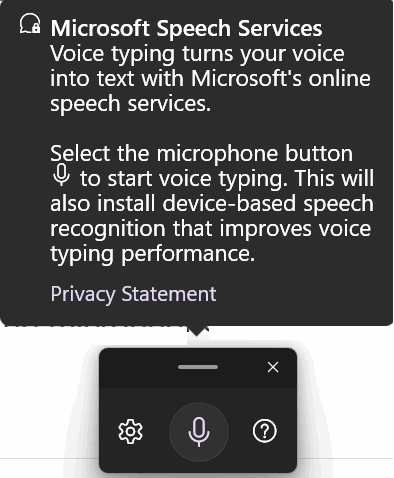
But it works the same way it does in Windows 10. Open Windows Speech Services in Windows 11 by using the Windows key + H shortcut.
We recommend that you click on the settings icon and turn on “Voice typing launcher”, “Automatic punctuation”, and select and adjust your microphone – and make sure your microphone volume is set at 80% or higher – you don’t want to have to yell, right?
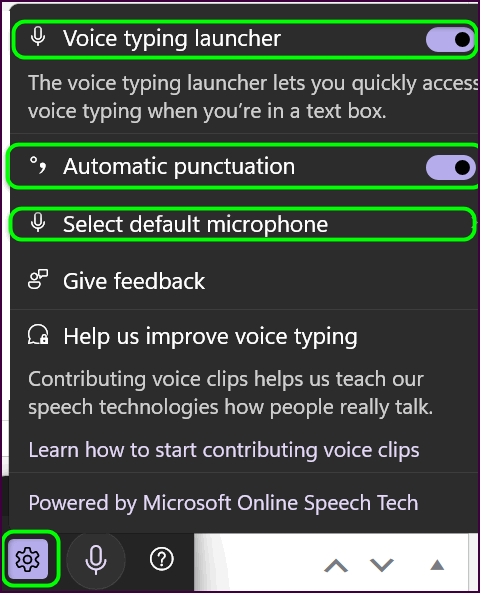
Here’s Windows Speech Services opening in Windows 11. To begin voice typing, click the microphone icon, or as Microsoft puts it, the “mic button”.
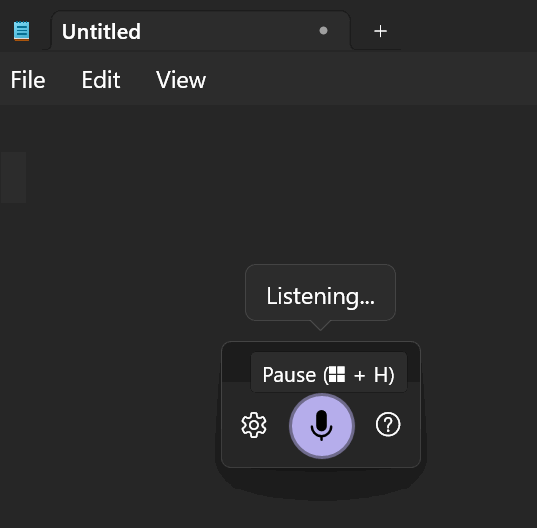
I put Windows Speech Services in Windows 11 to the test using a poem by Robert Frost called ‘Stopping by Woods on a Snowy Evening”. I used Windows Notepad for this example.
I’ll give Windows Speech Service an A-minus; it only made a few minor errors in capitalization. Why it thought the words, little, horse, and queer needed to be capitalized, I do not know. However, it would be easy to correct, and still be much faster than typing — well, at least MY typing.
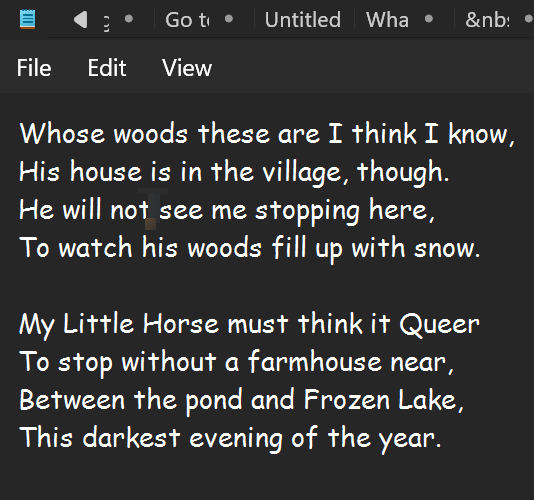
And, like Windows 10’s Dictation feature, you can use Windows 11’s Microsoft Voice Services to type reminders, notes, recipes, journals, essays, stories, lists, emails, and more.
Here’s an email I wrote using Microsoft Speech Services…
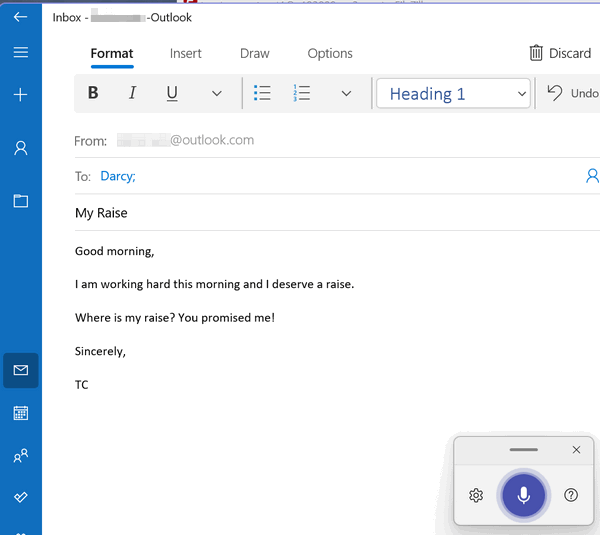
Unfortunately (and predictably), Darcy ignored my email, and I didn’t get my raise. But I can’t blame that on poor dictation by Microsoft Speech Services!
When you first start using Microsoft Speech Services in Windows 11, it may ask if you want to contribute your voice clips to improve Speech Services. You can choose “Yes” to contribute your voice clips, or “No” if you don’t want to contribute. If you do choose to contribute, they won’t be linked to you, your computer, or your IP address – they’ll be anonymously added to the database of voice clips that will help make Windows speech services (dictation) even better. And the better it gets, the more talking and less typing you’ll do.
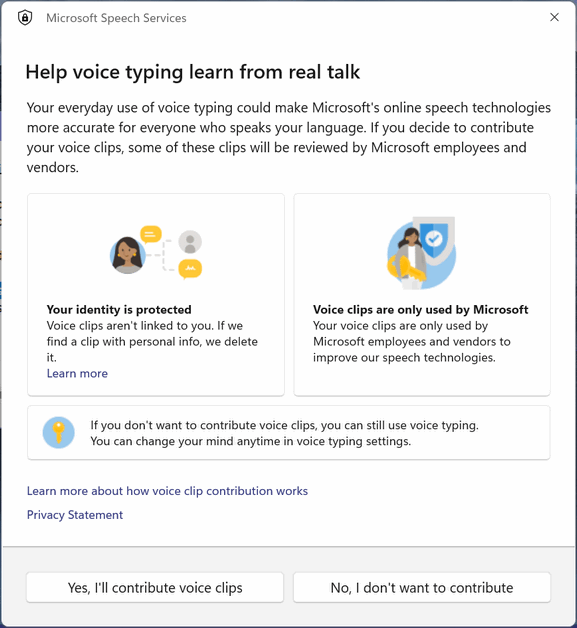
Save time. Talk instead of typing. Windows dictation (Speech services) is better than ever and can save you a lot of time… whether you’re using Windows 10 or Windows 11. All you have to do is take the time to learn to use it. Once you do, you might find you’re a faster talker than a typist!
![]()
A Quick Way to Sort Your Emails in Gmail
For everyone who uses Gmail
Here’s a great tip for anyone who uses Gmail and doesn’t already know how to jump to the bottom (oldest email) of your list of emails in any Gmail folder. But did you know that you can jump to the oldest emails in your list of emails in Gmail with one click?
In your Gmail account, look for “1-100” right above the email list and hover over it until you see a dropdown menu. By default, Gmail shows your newest emails first. If you have not changed this, you’ll see “Oldest” in the menu. Click “Oldest” to go to the “bottom” (oldest) of your list of emails.
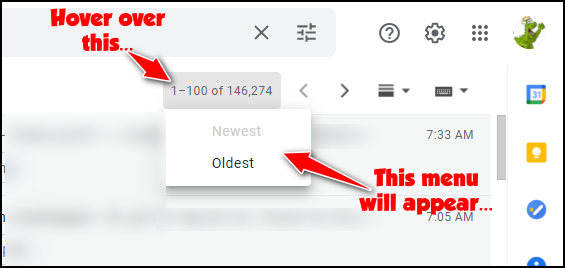
When you’re viewing your oldest emails and want to jump back to the top (newest emails first), just hover over the email count and click “Newest”. And you’re back to the default view – that is, the newest emails first (at the top).
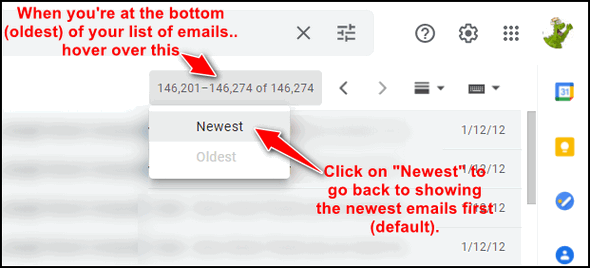
This method works in any folder (Inbox, Sent, All Mail, etc.) And it works no matter how many emails you have in a folder.
![]()
Seeing Clearly: How Open Windows Magnifier with an Easy Windows Key Shortcut
Windows 10 / Windows 11
Do you ever find yourself squinting at your computer screen, trying to read small text or see tiny details? As our eyes get older, it’s a common challenge. But guess what? Your Windows computer comes with a fantastic built-in tool called Magnifier that can help you see everything on your screen more clearly. It’s also extremely easy to turn on and off with just a couple of keys.
We will show you how to use a simple keyboard trick involving the Windows Key to make your screen easier to read.
What is the Magnifier?
Think of the Magnifier as a digital magnifying glass for your computer screen. It can zoom in on any part of what you’re looking at, whether it’s an email, a website, a photo, or a document. This means you don’t have to strain your eyes anymore to see something on your screen.
How to Turn On and Off the Magnifier (The Easy Way)
This is the trick you’ve been waiting for! It’s simple!
To turn on the Magnifier, press and hold the Windows Key and then press the plus sign (+) key on your keyboard.
You should immediately see your screen zoom in. A small “Magnifier” window will also appear, showing your current zoom level (like 100%, 200%, etc.).

To make it zoom in more: Keep holding the Windows Key and press the plus sign (+) key again. Each time you press the + key, it will zoom in further.
To zoom out (make things smaller): Press and hold the Windows Key and then press the minus sign (-) key on your keyboard. Each time you press the – key, it will zoom out.
To turn off the Magnifier: Press and hold the Windows Key and then press the Escape (Esc) key. The Esc key is usually in the top-left corner of your keyboard. You can also click the “X” (close) button on the small Magnifier window that appears.
Moving Around When Magnified
When you’re zoomed in, you might not see your whole screen at once. To move around and see different parts of your magnified screen. Just move your mouse cursor to the edges of the screen, and the magnified view will follow it. You can also use your keyboard arrows to scroll around the magnified view.
Tips for Using Magnifier
+
The Magnifier has several ways it displays the magnified view. You can change this by clicking the gear icon (settings) in the small Magnifier window.
By default, Magnifier magnifies the entire screen. This is usually the most helpful.
Lens: Creates a movable magnifying glass that follows your mouse.
Docked: Creates a magnified area at the top of your screen while the rest of the screen stays normal.
The small Magnifier window that appears has controls for zooming in/out, changing views, and accessing additional settings. You can usually drag this window out of your way if it’s blocking something important.
Magnifier is already built into your Windows 10 or Windows 11 computer, so there’s nothing to download or install.
Don’t be afraid to experiment with the Windows Key + + and – keys. It’s a great tool for making your computer experience more comfortable and less strenuous on your eyes. It might take some getting used to, but once you do, you’ll wonder how you ever managed without it!
Want more tips, tricks, and information?
We have thousands of Windows tips, tricks, and more on our InfoAve website.
Subscribe to our free InfoAve Daily newsletter.
![]()

THANK YOU FOR HELPING US!
When you support us with a small gift, you help us continue our mission
to keep you informed, separate the truth from the hyperbole, and help
you stay safer online. Plus, our computer tips make your computer easier
to use.
Did you know that we provide support to thousands of people? Every week,
we help dozens of people via email at no charge. The questions and
answers you see in our newsletters are from the email answers and help
we provide to everyone free of charge.
Thanks to your gifts, we do a lot more than provide this free newsletter. We help you recognize online threats, fight for your online privacy, provide you with the knowledge you need to navigate the Web safely, provide you with suggestions for safe, free software and websites, and help you get more out of your PC.
Please help us keep up the good fight with a small gift.
Interested in making an automatic monthly gift? Visit this page. Help us keep helping you... and help us keep you safe on the Web
![]()

Thousands of Free Fonts for All You Font Lovers
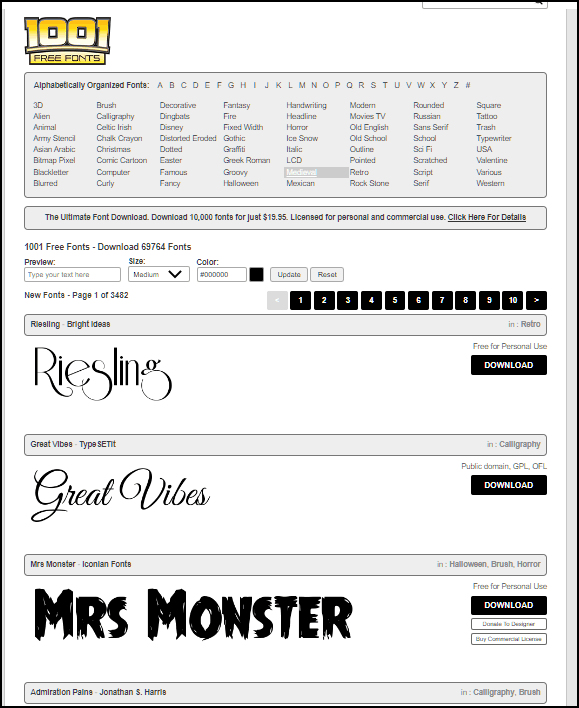
We both love free fonts – because we’re broke and old and goofy. But you don’t have to be broke, old, or goofy to like free fonts. No ma’am. No sir. A lot of people love free fonts!
But alas, crooks know what people love so you gotta be careful with some of the free font sites out there. Some of them are traps loaded with downloads bundled with bad things along with the fonts. Yep, many font sites like to play “let’s fool the suckers into downloading malware with the fonts”. But you don’t want that and we don’t want that. All of us free font lovers just want free fonts and NO GAMES.
On today’s Cloudeight site pick, you’ll find almost 3500 pages of free fonts. The site is called “1001 Fonts”. Did we count them to make sure there are 1001 fonts? Nope, we didn’t. But we can multiply… and we mean that in the mathematical sense only.
As of today, there are 3482 pages of fonts. At 10 fonts per page that’s a lot more than 1001. That’s like over 34,000 fonts. What could you possibly do with all those fonts?


The developers apparently can make fonts and find fonts but they don’t say much at all, so we can’t invite them here to give you a few words about this site because they have nothing to say. Oh well.
The fonts from 1001 Free Fonts are free for personal use only. If you’re a mogul and you plan to use fonts for TV or print advertising or for advertising pork chops in the front window of your grocery store, buy a commercial license. If you just want to use them to make cute graphics or whatever, they’re free. Capiche?

Click on the image above or on this link to visit 1001 Free
Fonts
![]()

Friends, Once
At first, I lied to myself. I tried to believe it didn't matter that our friendship was over. Sometimes, I make things more complicated than they need to be.We were good friends, and then we weren't. It's really that simple.
It's a bit like getting a terminal diagnosis. First, you deny it. Then, you try to rationalize it. Eventually, you realize you just have to accept it.
We were friends. Then, suddenly, in a matter of minutes, we weren't. I still can't truly accept it, but I see now that I have no choice.
You like to think it's my fault our friendship ended. And yes, I wasn't completely honest with you. That's true. You had every right to be angry, and I suppose, because of it, you felt you had the right to end things.
Me? I prefer to believe it's your fault, because after all this time, you still haven't truly forgiven me. Of course, you'll say you have...
Read the rest of this essay here.

What is WebP?
WebP is an image format developed by Google. The main advantage of WebP is that it reduces the file size of an image by up to 30% compared to files in JPG or PNG format, without any noticeable loss of image quality. This means you can store a lot more pictures in the same amount of disk space.
But that’s not all WebP is good for. Since WebP images have smaller file sizes, large images open more quickly on the web. And because of reduced loading times, more and more websites are using WebP images more frequently.
On the downside, some older web browsers like Internet Explorer don’t support WebP images.
If you’re using Windows 10 or Windows 11, you can open WebP images without installing any 3rd-party programs by right-clicking on a WebP file and choosing “Open with” and selecting Chrome, Microsoft Edge, or Paint.
To see examples of JPG images converted to WebP, see our article here.

Sales of the following products and services help support our newsletters, websites, and free computer help services we provide.
Cloudeight Direct Computer Care:
Single Keys, SeniorPass, or Season Tickets - always a great deal. Cloudeight Direct Computer Care is like having PC insurance.
Get more information here.
Emsisoft Anti-Malware: Emsisoft is the only Cloudeight-endorsed and recommended Windows security program. It provides users with a complete antivirus, antimalware, anti-ransomware,
and anti-PUPs solution. We offer single Emsisoft licenses and multi-computer licenses at discount prices. Also, we offer our exclusive Emsisoft with Cloudeight installation & setup.
Get more information here.
Reg Organizer: Reg Organizer is the Swiss Army Knife of Windows tools. It's far more than just a registry optimizer and cleaner... it's a Windows all-in-one toolkit. Reg Organizer helps you keep your computer in tip-top shape and helps you solve annoying Windows problems. Reg Organizer works great with Windows 10
and Windows 11! Get more information about Reg Organizer (and get our special discount prices) here.
MORE IMPORTANT STUFF!
Your InfoAve Weekly Members' Home Page is located here.
Help us grow! Forward this email newsletter to a friend or family member - and have them sign up for InfoAve Weekly here!
Get our free daily newsletter! Each evening, we send a short newsletter with a tip or trick or a computer-related article - it's short and sweet - and free. Sign up right now.
We have thousands of Windows tips and tricks and computer articles posted on our Cloudeight InfoAve website. Our site has a great search engine to help you find what you're looking for, too! Please visit us today!
Help us by using our Start Page. It costs nothing, and it helps us a lot.
Print our Cloudeight Direct Flyer and spread the word about our computer repair service! If you want to help us by telling your friends about our Cloudeight Direct Computer Care service, you can download a printable flyer you can hand out or post on bulletin boards, etc. Get the printable PDF Cloudeight Direct Computer Care flyer here.

We'd love to hear from you!
If you have comments, questions, a tip, a trick, a freeware pick, or just want to tell us off for something, let us know.
If you need to change your newsletter subscription address, please see "Manage your subscription" at the very bottom of your newsletter.
We received hundreds of questions for possible use in IA news. Please keep in mind that we cannot publish all questions and answers in our newsletters, but we try to answer every single question. We can only use a few in each week's newsletter. If you have a support question about a service or product we sell, please contact us here.
Subscribe to our Daily Newsletter! Get computer tips & tricks every night. Our daily newsletter features a computer tip/trick or two every day. We send it out every night around 9 PM Eastern Time (USA). It's short and sweet, easy to read, and FREE. Subscribe to our Cloudeight InfoAve Daily Newsletter!

We hope you have enjoyed this issue of Cloudeight InfoAve Weekly. Thanks so much for your support and for being an InfoAve Weekly subscriber.
Have a great weekend. Be safe!
Darcy & TC
Cloudeight InfoAve Weekly - Issue #1131
Volume 22, Number 34
June 13, 2025
Not a subscriber? Subscribe to our FREE Cloudeight InfoAve Weekly Newsletter here.

"Cloudeight InfoAve Weekly" newsletter is published by:
Cloudeight Internet LLC
PO Box 73
Middleville, Michigan, USA 49333-0073
Read our disclaimer about the tips, tricks, answers, site picks, and freeware picks featured in this newsletter.
Copyright ©2025 by Cloudeight Internet

